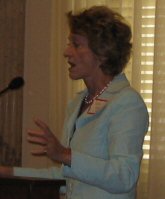
Care Coordination Across the Continuum
A WHCoA Solutions Forum
The White House Conference on Aging occurs once a decade to make aging policy recommendations to the President and Congress, and to assist the public and private sectors in promoting dignity, health, independence and economic security of current and future generations of older persons. The 2005 White House Conference on Aging occurs as the first wave of the baby boom generation prepares for retirement, creating an important opportunity to creatively assess aging in America and improve the lives of older Americans. This will be the first White House Conference on Aging of the 21st Century.
The process leading up to the actual Conference includes Solutions Forums that develop recommendations on many aspects of aging. One WHCoA Solutions Forum that is specifically relevant to persons approaching the end of their lives has to do with "Care Coordination Across The Continuum," which is looking in detail at health care for the final years of life. That panel has prepared a number of recommendations that will be presented to the full Conference in November of 2005. If implemented, these recommendations could have sweeping impact on the delivery of health care for the next decade. You can download the full report from the Care Coordination Across The Continuum Solutions Forum here. For information about other activities of the White House Conference on Aging you may visit their web site at www.whcoa.gov
Here is a summary of the seven recommendations developed by the Care Coordination Across The Continuum Solutions Forum:
- Pay more for services that provide comprehensive longitudinal care, and less for uncoordinated services.
- Require all critical elements of optimal patient care. Clinical service providers who cannot do these things should not be regularly providing care to this population.
- Ensure continuity of patient records across settings and time.
- Sponsor intensive regional demonstrations of planning and care delivery.
- Require an annual Federal report on the long-term care workforce, including family caregivers.
- Require an annual report on progress toward reliable, sustainable longitudinal care arrangements for those who are sick, frail, or disabled in old age.
- Engender broad interest and activism among family and long-term-care caregivers.
Here are two specific steps you can take to get your voice heard:
- Call your Congressperson and Senator's offices
and find out who is their health staffer - and be sure that person is on board. You can use the Congressional Directory to find contact information.
- Use the WHCoA online contact form and tell them how important it is that they pay attention to serious chronic illness, continuity, and caregiving - and that they follow at least the recommendations of the Care Coordination Across The Continuum Solutions Forum.
|
Downloads:
You
You
|
|
Jon Fuller Interview (8:53)
Physician Jon Fuller explains how the WHCOA works and how you can make your voice heard. You can download this interview as a podcast. Click to listen, or right click to save the target to your own player. |
|
Contacts:
Anne Wilkinson, Ph.D. Joanne Lynn, MD |

